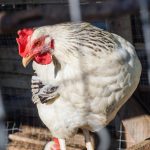Chickens have specific requirements for cold weather survival that are essential for their health and well-being. Unlike mammals, chickens have limited ability to regulate their body temperature, making them more vulnerable to cold conditions. They rely on environmental factors and nutrition to maintain warmth.
In cold weather, chickens instinctively fluff their feathers to create an insulating air layer and huddle together for shared body heat. However, these natural behaviors may be insufficient in extreme cold. Proper nutrition and a suitable environment are crucial for chickens during winter.
They require constant access to fresh water, as dehydration is a significant risk in cold weather. Chickens may be reluctant to drink cold water, so providing warm water or using heated waterers can encourage adequate hydration. Regular checks are necessary to prevent water from freezing.
Protection from drafts and dampness is vital, as these conditions can increase susceptibility to illness. Insulating the coop and ensuring proper ventilation helps create a comfortable environment for chickens in winter. By addressing these specific needs, chicken owners can help their flocks remain healthy and comfortable during cold weather.
Table of Contents
- 1 Providing the right type of feed for warmth
- 2 Incorporating high-energy foods into their diet
- 3 Using natural supplements to boost their warmth
- 4 Creating a comfortable and insulated environment for chickens
- 5 Monitoring and adjusting their diet as temperatures fluctuate
- 6 Consulting with a veterinarian for additional advice on keeping chickens warm
- 7 FAQs
- 7.1 What are some foods that can help keep chickens warm in cold weather?
- 7.2 Why is it important to keep chickens warm in cold weather?
- 7.3 Can I feed my chickens hot foods to keep them warm?
- 7.4 Are there any foods that I should avoid feeding my chickens in cold weather?
- 7.5 How else can I help keep my chickens warm in cold weather?
Key Takeaways
- Chickens need a draft-free and insulated coop to stay warm in cold weather
- Feeding chickens high-energy foods like corn and grains can help keep them warm
- Natural supplements like garlic and ginger can boost chickens’ warmth
- Providing a comfortable environment with dry bedding and adequate ventilation is crucial for chickens in cold weather
- Regularly monitor and adjust chickens’ diet as temperatures fluctuate to ensure they stay warm and healthy
- Consulting with a veterinarian can provide additional expert advice on keeping chickens warm and healthy
Providing the right type of feed for warmth
High-Quality Layer Feed for Egg Production and Health
In cold weather, it’s essential to provide chickens with the right type of feed to help them stay warm. A high-quality layer feed is vital for providing the necessary nutrients for egg production and overall health. Layer feed typically contains a higher percentage of protein and calcium, which are crucial for egg production and maintaining strong bones.
Supplementing with Grains for Extra Energy
During the winter months, it can be beneficial to supplement their diet with grains such as corn and barley. These grains are high in carbohydrates, which can help chickens generate heat as they digest the food.
Feeding Scratch Grains in the Evening for Extra Warmth
Feeding them scratch grains in the evening can also help keep them warm overnight, as the digestion process generates heat within their bodies. It’s important to note that scratch grains should be given in moderation, as they are not a complete source of nutrition and should be used as a supplement to their regular feed.
Incorporating high-energy foods into their diet

In addition to grains, incorporating high-energy foods into their diet can help chickens stay warm during the winter months. Foods such as sunflower seeds, peanuts, and mealworms are high in fat and protein, which can provide chickens with the energy they need to stay warm. These foods can be given as treats or mixed into their regular feed to provide an extra boost of energy.
Another high-energy food that can benefit chickens in cold weather is black oil sunflower seeds. These seeds are high in fat and protein, which can help chickens maintain their body temperature in cold weather. They also provide essential fatty acids, which are important for overall health and immune function.
Adding a small amount of black oil sunflower seeds to their diet can help provide the extra energy they need to stay warm during the winter months.
Using natural supplements to boost their warmth
In addition to high-energy foods, natural supplements can also help boost the warmth of chickens during cold weather. One natural supplement that can benefit chickens in the winter is apple cider vinegar. Adding a small amount of apple cider vinegar to their water can help improve digestion and nutrient absorption, which can support overall health and warmth.
Apple cider vinegar also has antibacterial properties, which can help support a healthy immune system. Another natural supplement that can benefit chickens in cold weather is garlic. Garlic has natural warming properties and can help support circulation and immune function.
Adding a small amount of fresh or powdered garlic to their feed can help boost their warmth and overall health during the winter months. It’s important to use garlic in moderation, as excessive amounts can have negative effects on their health.
Creating a comfortable and insulated environment for chickens
Creating a comfortable and insulated environment for chickens is essential for helping them stay warm during the winter months. Insulating their coop can help retain heat and protect them from drafts and dampness. Adding extra bedding such as straw or wood shavings can provide additional insulation and warmth.
It’s important to regularly clean their coop and remove any damp bedding to prevent mold and bacteria from developing. In addition to insulation, providing adequate ventilation is important for maintaining a healthy environment for chickens in cold weather. Proper ventilation can help remove excess moisture and ammonia from their coop, which can help prevent respiratory issues.
It’s important to strike a balance between insulation and ventilation to create a comfortable environment for them during the winter months.
Monitoring and adjusting their diet as temperatures fluctuate

Boosting Energy in Extreme Cold
As temperatures drop, it’s essential to monitor and adjust your pet’s diet to provide them with the extra energy they need to stay warm. In extremely cold weather, increasing their feed intake can help support their energy needs. Additionally, providing warm water or adding electrolytes to their water can help maintain their overall health and hydration.
Maintaining a Healthy Weight in Milder Weather
On the other hand, during milder winter weather, it may be necessary to reduce their feed intake to prevent obesity and related health issues. Regularly assessing their body condition and adjusting their diet as needed is crucial to ensure they maintain a healthy weight.
Monitoring Health and Behavior
Monitoring your pet’s behavior and overall health can provide valuable insight into whether they are getting the nutrition they need to stay warm and healthy during the winter months. By keeping a close eye on their health and making adjustments to their diet accordingly, you can help ensure they thrive throughout the winter season.
Consulting with a veterinarian for additional advice on keeping chickens warm
Consulting with a veterinarian who specializes in poultry can provide valuable advice on keeping chickens warm during the winter months. A veterinarian can assess the specific needs of your flock and provide tailored recommendations for their diet, environment, and overall care. They can also provide guidance on identifying signs of illness or nutritional deficiencies that may impact their ability to stay warm in cold weather.
Additionally, a veterinarian can provide advice on preventative measures to protect your flock from common winter ailments such as frostbite and respiratory issues. They can also recommend specific supplements or medications that may benefit your flock during the winter months. Working with a veterinarian who has experience with poultry can provide peace of mind and ensure that you are taking the necessary steps to keep your chickens warm and healthy during the winter months.
If you’re looking for tips on how to keep your chickens warm during the winter, you might want to check out this article on chicken coop nest boxes. It offers valuable advice on creating a cozy and insulated space for your chickens to roost and lay eggs, which can help them stay warm during the colder months.
FAQs
What are some foods that can help keep chickens warm in cold weather?
Some foods that can help keep chickens warm in cold weather include cracked corn, sunflower seeds, and mealworms. These foods are high in fat and protein, which can help chickens generate heat to stay warm.
Why is it important to keep chickens warm in cold weather?
Chickens are susceptible to cold weather and can suffer from frostbite and hypothermia if not kept warm. Keeping chickens warm in cold weather is important for their health and well-being.
Can I feed my chickens hot foods to keep them warm?
It is not recommended to feed chickens hot foods as it can cause digestive issues. Instead, focus on providing high-fat and high-protein foods that can help chickens generate heat internally.
Are there any foods that I should avoid feeding my chickens in cold weather?
Avoid feeding chickens foods that are high in water content, such as watermelon or cucumber, as they can lower the chickens’ body temperature. Additionally, avoid feeding chickens foods that are difficult to digest, as their bodies will need to work harder to process the food, which can lower their body temperature.
How else can I help keep my chickens warm in cold weather?
In addition to providing warm foods, you can help keep chickens warm in cold weather by insulating their coop, providing plenty of bedding, and ensuring they have access to fresh, unfrozen water. Additionally, consider using heat lamps or heated waterers to provide additional warmth.
Meet Walter, the feathered-friend fanatic of Florida! Nestled in the sunshine state, Walter struts through life with his feathered companions, clucking his way to happiness. With a coop that’s fancier than a five-star hotel, he’s the Don Juan of the chicken world. When he’s not teaching his hens to do the cha-cha, you’ll find him in a heated debate with his prized rooster, Sir Clucks-a-Lot. Walter’s poultry passion is no yolk; he’s the sunny-side-up guy you never knew you needed in your flock of friends!







